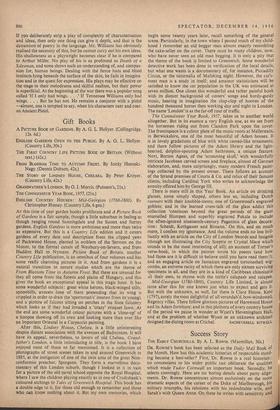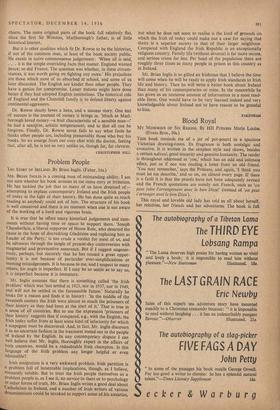Success Story
THE EARLY CHURCHILLS. By A. L. Rowse. (Macmillan, 36s.) DR. ROWSE'S book has been selected as the Daily Mail Book of the Month. How has this academic historian of respectable stand- ing become a best-seller? First, Dr. Rowse is a real historian : no concessions to his wider public can obliterate the qualities which made Tudor Cornwall an important book. Secondly, he selects cunningly. Here are no boring details about party align- ments. Dr. Rowse concentrates almost exclusively on the more dramatic aspects of the career of the Duke of Marlborough, his military triumphs, his relations with his redoubtable wife, and Sarah's with Queen Anne. On these he writes with sensitivity and charm. The more original parts of the book fall relatively flat, since the first Sir Winston, Marlborough's father, is of little historical interest.
But it is other qualities which fit Dr. Rowse to be the historian, if not of the common man, at least of the book society public. He excels in naive commonsense judgements : 'When all is said, . . . it is the simple overriding facts that matter. England wanted peace; so did France. The question was whether, in these circum- stances, it was worth going on fighting any more.' His prejudices are those which most of us absorbed at school, and some of us later discarded. The English are kinder than other people. They have a genius for compromise. Lesser nations might have done better if they had adopted English institutions. The historical role of England and the Churchill family is to defend liberty against continental aggressors.
Dr. Rowse dearly loves a hero, and a success story. One test of success is the amount of money it brings in. 'Much as Marl- borough loved money—a trait characteristic of a sensible man—' he had a sensitive, artistic temperament, and to that all can be forgiven. Finally, Dr. Rowse never fails to say what fools he thinks other people are, including presumably those who buy his hooks. So we emerge from our cosy chat with the doctor, feeling that, after all, he is not so very unlike us, though far, far cleverer.
CHRISTOPHER HILL











































 Previous page
Previous page